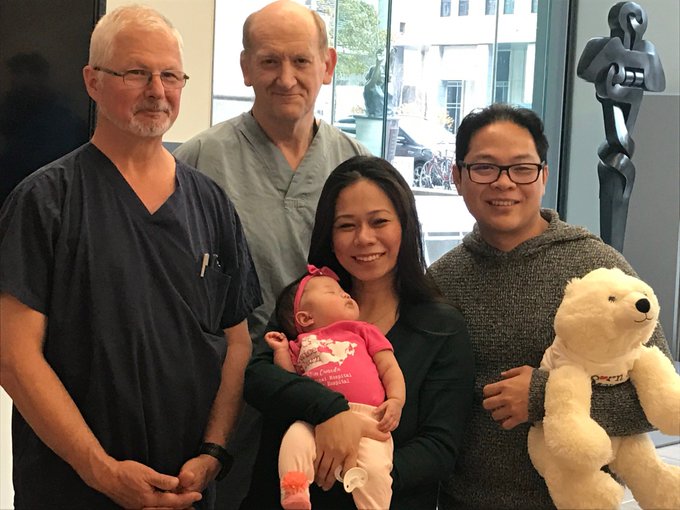First in-utero surgery in Canada for the treatment of #spinabifida a success. Read more about how the teams from #SickKids & @MountSinai helped Baby Eiko before she was even born ow.ly/9QAT30gzPZ5

Canada: ‘Miracle baby’ undergoes first successful spina bifida surgery in the womb
Human Interest·By Nancy Flanders
Canada: ‘Miracle baby’ undergoes first successful spina bifida surgery in the womb
For the first time in Canada, surgeons have successfully performed surgery to repair a form of spina bifida on a baby in utero. The procedure must be performed between 16 and 26 weeks gestation, and while it has been completed in the United States and Australia, Canada had yet to reach this major accomplishment. Abortion is legal in Canada through all nine months of pregnancy.
On Tuesday, November 14, 2017, doctors at Mount Sinai Hospital and the Hospital for Sick Children introduced two-month-old Eiko Crisostomo who was diagnosed with spina bifida at 20 weeks gestation.
“Usually that’s the time when you find out the gender,” Eiko’s mother Romeila Son told reporters at the press conference. “We were very excited to finally have a girl after having four boys.”
But when Eiko’s parents, Romeila and Romeo, found out their daughter had a form of spina bifida known as myelomeningocele, they were heartbroken. Doctors predicted that their daughter would have brain damage, would need surgeries throughout her life, and would require the use of a wheelchair. They decided to do whatever it took to help their daughter, which meant Eiko would undergo a surgery that had never been done before in Canada.
“I wasn’t scared,” said Romeila. “I had zero doubt and 100 percent confidence.”
On June 4, 2017, at 25 weeks gestation, the medical team prepared to operate on Eiko, giving her anesthesia to protect her from pain and temporarily paralyzing her so they could perform the surgery. The surgery would close the skin over the spinal cord which was protruding into the amniotic fluid.
Eiko was born by C-section on August 19, 2017, and her mother said she is “doing very normal baby things.”
While the surgery does not guarantee that Eiko will feel no effects of spina bifida, it improves her chances of walking, reduces her need for brain shunts, and reduces her chances of having brain damage.
Baby Eiko has been home for 2 months and is doing amazing. Since her birth, she has not needed any further intervention for spina bifida
“Right now, her brain is stable, her legs are moving and kicking as you can see. All of our prayers were answered,” said Romeila. “She’s our little miracle.”
The surgeons noted that since Eiko underwent the groundbreaking procedure, three more unborn children with spina bifida have undergone the surgery successfully at their hospitals.
Catherine Harper of Auckland, New Zealand, flew to Brisbane, Australia, in December of 2016 to undergo the same surgery on her preborn son who was diagnosed with spina bifida.
“Usually termination is the main option in New Zealand, but there is still a chance you might have an amazing child,” Harper told the New Zealand Herald. “[…] We are trying everything possible to make our son’s life better. […] Anyone that has a kid knows you would do anything for them.”
Live Action News is pro-life news and commentary from a pro-life perspective.
Our work is possible because of our donors. Please consider giving to further our work of changing hearts and minds on issues of life and human dignity.
Contact editor@liveaction.org for questions, corrections, or if you are seeking permission to reprint any Live Action News content.
Guest Articles: To submit a guest article to Live Action News, email editor@liveaction.org with an attached Word document of 800-1000 words. Please also attach any photos relevant to your submission if applicable. If your submission is accepted for publication, you will be notified within three weeks. Guest articles are not compensated (see our Open License Agreement). Thank you for your interest in Live Action News!
Read Next

Amid lawsuits, is Meta trying to protect minors from abortion content?
Nancy Flanders
·More In Human Interest

Human Interest
Some wanted baby Chance dead. Now he’s home with his big brother.
Cassy Cooke
·
Human Interest
Preemie home after 9 months, thanks to same doc who once cared for mom
Isabella Childs
·
Human Interest
Key Australian pro-life figure Margaret Tighe dies at age 94
Angeline Tan
·
Human Interest
Fifth graders surprise classmate at his adoption ceremony
Nancy Flanders
·
Human Interest
Indiana man gets 30 years for attempted murder of wife and death of preborn baby
Bridget Sielicki
·More From Nancy Flanders

Analysis
Amid lawsuits, is Meta trying to protect minors from abortion content?
Nancy Flanders
·
Pop Culture
Hulu show 'Tell Me Lies' promotes abortion... with Planned Parenthood's help
Nancy Flanders
·
Analysis
Pro-life laws don't need to be overturned. Doctors need to read them.
Nancy Flanders
·
Pop Culture
Chris Pratt takes heat for partnering with Catholic, pro-life Hallow app
Nancy Flanders
·
Abortion Pill
South Dakota House advances bill to stop mail-order abortion pill
Nancy Flanders
·
